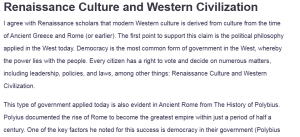Renaissance Culture and Western Civilization
I agree with Renaissance scholars that modern Western culture is derived from culture from the time of Ancient Greece and Rome (or earlier). The first point to support this claim is the political philosophy applied in the West today. Democracy is the most common form of government in the West, whereby the power lies with the people. Every citizen has a right to vote and decide on numerous matters, including leadership, policies, and laws, among other things: Renaissance Culture and Western Civilization.
This type of government applied today is also evident in Ancient Rome from The History of Polybius. Polyius documented the rise of Rome to become the greatest empire within just a period of half a century. One of the key factors he noted for this success is democracy in their government (Polybius 275). Notably, there was some form of discrimination whereby only specific people with certain privileges could vote, but this has evolved now to include everyone in the modern West.
The second point is that both Western and ancient Rome and Greece have high regard for ideals like patriotism, which requires one to sacrifice themselves for the sake of the nation or go against evil in society for the greater good. Thirdly, I concur that modern civilization is influenced by ancient Greek and Roman culture, particularly with respect to how society views men and women. From the story of The Rape of Lucretia and Laudatio Turiae, and looking at the history of women in ancient Greece, there is clear evidence that women were expected to fill traditional roles like being wives and mothers and not have careers (Livy 2; Wistrand 30).
Further, women were not expected to occupy positions of power, nor were they given power to make important decisions like voting. This has persisted until today, when women are still fighting for equality with men.
It was only till the late twentieth century that women were allowed to vote, and there were decades-long fights for rights like for working before that. Today’s society has come a long way from back then, and now women have more rights than before. However, patriarchy still remains, and women are still facing challenges brought on by their gender.
This shows that both good and bad aspects of ancient Rome and Greece have been passed down from generation to generation. This culture is not exactly the same as it was back then because people have continued to evolve, but the foundations are still there. In conclusion, today’s Western culture is undeniably influenced by classical civilizations, but over time, it has also incorporated innovations and shifts from developments and mixture with other cultures.
References
Polybius. Histories: Book VI. Translated by W.R. Paton, University of Chicago, penelope.uchicago.edu/Thayer/E/Roman/Texts/Polybius/6*.html. Accessed 28 Nov. 2024.
Wistrand, Erik. “Laudatio Turiae.” University of Grenoble Alpes Roman Law Resources, droitromain.univ-grenoble-alpes.fr/Anglica/Laudatio_Turiae_Wistrand.htm. Accessed 28 Nov. 2024.
Livy. “The Rape of Lucretia.” Internet Ancient History Sourcebook, edited by Paul Halsall, Fordham University, sourcebooks.fordham.edu/ancient/livy-rape.asp. Accessed 28 Nov. 2024.
ORDER A PLAGIARISM-FREE PAPER HERE
We’ll write everything from scratch
Question
Western Civilization
The scholars of the Renaissance believed they were breathing new life into the culture of the classical world. The underlying motivation of a “Western Civilization” course is to show the continuation of a common culture from the time of Ancient Greece and Rome (or earlier) to the present day.
Do you agree? When you think about the civilizations that we studied in this course, do you get the feeling they shared our culture? Or do you think our modern culture comes from somewhere else?
Try to be direct and specific in your response, and use concrete examples from the course and from modern life.

Renaissance Culture and Western Civilization
- https://penelope.uchicago.edu/
Thayer/E/Roman/Texts/Polybius/ 6*.html - https://www.gutenberg.org/
files/10827/10827-h/10827-h. htm - https://sourcebooks.fordham.
edu/source/petrarch1.asp - https://sourcebooks.fordham.
edu/ancient/livy-rape.asp - https://droitromain.univ-
grenoble-alpes.fr/Anglica/ Laudatio_Turiae_Wistrand.htm

